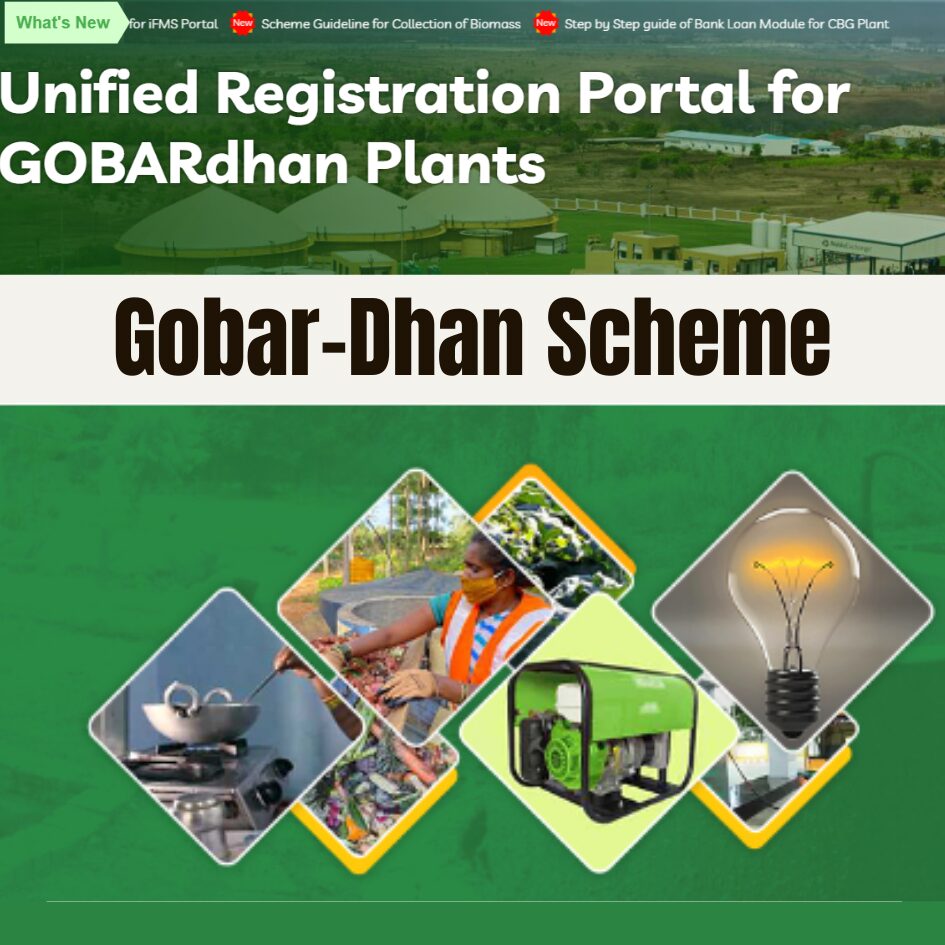About Gobar Dhan Scheme
The GOBAR-DHAN scheme is a national program that is a priority under the Swachh Bharat Mission Grameen-Phase II. The primary objective of this program is to provide support to villages in managing their cattle and biodegradable waste efficiently. The scheme aims to promote community awareness and ownership and help villages manage their cattle, agro residues, and other biodegradable waste effectively. The benefits of this scheme include converting waste into wealth, improving environmental sanitation, and curbing vector-borne diseases. The Department of Drinking Water and Sanitation provides technical assistance and financial support of up to Rs 50 lakh per district for every district to achieve safe management of cattle and biodegradable waste.

Objectives
- To promote the scientific management of cattle dung and other organic waste in rural areas.
- To generate biogas from cattle dung and other organic waste for cooking and lighting purposes.
- To reduce the dependence on fossil fuels and reduce carbon emissions.
- To improve sanitation and hygiene in rural areas by promoting the use of biogas plants and composting.
- To create new job opportunities and boost rural incomes by promoting the sale of biogas, organic manure, and other by-products.
Full Overview Of Gobar Dhan Scheme
| Name of Scheme | Gobar-Dhan Scheme |
|---|---|
| Announcement | Govt of India |
| Implementation | Ongoing |
| Objectives | To support villages in effectively managing their cattle and biodegradable waste, and promote community awareness and ownership |
| Incentive | Financial support of up to Rs 50 lakh per district |
| Beneficiaries | Villages in India |
| How to Apply | Interested communities can contact the Department of Drinking Water and Sanitation or their respective state government |
| Official Website | https://sbm.gov.in/gbdw20/Home.aspx |
Eligibility Criteria
The Gobar-Dhan Scheme is open to the following categories of beneficiaries:
- Individual farmers, cattle owners, and self-help groups in rural areas.
- Gram Panchayats, Panchayat Samitis, and Zilla Parishads.
- Non-governmental organizations (NGOs) and other private agencies.
Benefits
The Gobar-Dhan Scheme provides the following benefits to the beneficiaries:
- Financial support for the construction of biogas plants and composting units.
- Training and technical support for the operation and maintenance of biogas plants.
- Income generation opportunities through the sale of biogas, organic manure, and other by-products.
- Improved sanitation and hygiene in rural areas.
- Reduced dependence on fossil fuels and reduced carbon emissions.
Environmental benefits:
- Reduces pollution: The scheme promotes the use of organic waste for biogas production, which reduces the emission of greenhouse gases and other pollutants.
- Improves sanitation: The scheme helps in managing cattle dung and other organic waste, which improves sanitation in rural areas.
Economic benefits:
- Generates income: The scheme provides financial assistance to farmers and entrepreneurs for setting up biogas plants and other waste-to-wealth projects.
- Creates jobs: The scheme creates jobs in the rural areas in the areas of waste collection, biogas production, and bio-manure production.
Social benefits:
- Improves health: The scheme provides clean cooking fuel to rural households, which reduces the incidence of respiratory diseases.
- Empowers women: The scheme provides training and financial assistance to women for setting up biogas plants and other waste-to-wealth projects.
Overall, the GOBAR-DHAN scheme is a comprehensive initiative that has the potential to provide a number of environmental, economic, and social benefits.
Here are some specific examples of the benefits of the GOBAR-DHAN scheme:
- In 2022, the GOBAR-DHAN scheme helped to generate over 100 million cubic meters of biogas, which reduced the emission of over 2 million tonnes of carbon dioxide.
- The scheme has also helped to create over 1 million jobs in the rural areas.
- In addition, the scheme has helped to improve the health of rural households by providing them with clean cooking fuel.
Implementation
- One model project should be set up in each district under Gobardhan Yojana
- Biogas plants can be built near cowsheds, vegetable markets, institutions, religious places, factories, etc.
- Biogas plants can also be installed in houses with animals and hilly areas.
- The individual biogas plant will be set up by Gram Panchayat in houses with more than 5 animals.
- Capacity of biogas plant will be 1-3 m³ in houses with 5 or more animals and 4-10 m³ in case of more animals.
- The scheme will be implemented through an agency with minimum 3 years of experience.
- DWSC will monitor the scheme at the district level.
- Monitoring of all plants will be done every 4 months and reported on National IMIS portal.
- All projects will be audited every year.
- Site selection for biogas plant should be done on open space without trees and plants nearby, near kitchen and animal shed, 2 meters away from house foundation, and away from water.
Required Documents
- The applicant should be from rural areas of the country.
- Only farmers will be considered eligible under this scheme.
- Aadhaar Card of the applicant
- residence certificate
- mobile number
- email id
- passport size photo
Guiding principles
The guiding principles of the implementation of GOBARdhan are:
- Prioritizing villages with high cattle population
- Enabling usage of financial provision of Rs 50 lakh by several villages in a district
- Popularizing the compelling business case for safe management of cattle dung and other organic waste among the rural population through intensive IEC (Information, Education, and Communication) at the local level
- Implementing GOBARdhan as a people’s initiative to tackle cattle dung in villages
- Promoting community collective action on GOBARdhan through IEC
- Creating infrastructure that enables it to be owned, operated, and managed by the community themselves
- Substantially reducing the incidence of vector-borne diseases and promoting public health
- Protecting health
- Increasing employment and promoting income generation opportunities for SHGs/farmers groups
- Generating organic manure which boosts agriculture and farm productivity
- Improving household savings by cutting down the LPG cost through the use of biogas as fuel.
How to apply for Gobar-Dhan Yojana
Steps to apply online for Gobar-Dhan Yojana

- go to “Register” and click on this page
- next Click lo
- Fill out the application form with personal details, address details, registration details, etc.
- Submit the form by clicking the submit button.
- Save the generated registration number for future reference.
No, there is no specific deadline for application under the GOBAR-Dhan scheme. The process is open for interested individuals or institutions to approach the Department of Drinking Water and Sanitation for support at any time.

